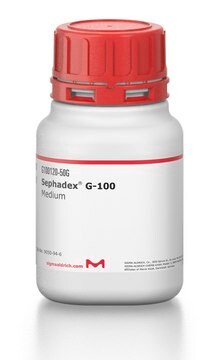GE28-9909-44
Superdex® 200 Increase 10/300 GL
Cytiva 28-9909-44, column L × I.D. 30 cm × 10 mm, 8.6 μm particle size
Synonym(s):
Superdex Increase
About This Item
Recommended Products
material
glass column
polyethylene filter
product line
Superdex®
mol wt
10000-600000 Da (globular proteins)
packaging
pkg of 1 ea
manufacturer/tradename
Cytiva 28-9909-44
parameter
<1.8 mL/min flow rate
<1.80 mL/min flow rate
25-500 μL sample volume
3.0 Mpa (580 psi)
bed volume
~24 mL
column L × I.D.
30 cm × 10 mm
matrix
agarose-dextran composite
polymeric
particle size
8.6 μm
cleaning
1-14
working range
3-12
separation technique
size exclusion (SEC)
General description
Superdex™ 200 Increase is a next-generation, dextran-agarose composite matrix for SEC. With smaller and more rigid beads than their predecessors, Superdex™ Increase columns deliver higher resolution purification in shorter run times.
Superdex™ 200 Increase has a selectivity curve optimized for excellent resolution of antibodies and macromolecules within the range Mr ~ 100 000 to ~ 300 000. It is well suited for detection and separation of antibody monomers, dimers, and aggregates present in monoclonal antibody preparations. The outstanding resolving power of this resin facilitates protein characterization, including analysis of antibody size variants, assessment of membrane protein size homogeneity, and the study of protein-protein interactions.
Superdex™ 200 Increase is optimized to give high resolution separation for proteins with molecular weights in the range Mr ~ 100 000 to ~ 300 000. Superose™ 6 Increase provides a complementary fractionation range, resolving very large protein complexes and macromolecules that Superdex 200 Increase cannot separate.
This agarose-based resin is alkali-resistant and supports cleaning-in-place (CIP) procedures. This capability allows the same column to be used for different proteins, with minimal risk of carry-over between samples.
Features and Benefits
- Enhanced performance: improved resolution and runtime compared to predecessor Superdex™ 200.
- Very high resolution: small bead size and narrow particle size distribution provide high resolution, for high protein purity.
- High flow rates: rigid beads give excellent pressure/flow properties.
Suitability
Storage and Stability
Legal Information
Signal Word
Warning
Hazard Statements
Precautionary Statements
Storage Class Code
3 - Flammable liquids
Certificates of Analysis (COA)
Search for Certificates of Analysis (COA) by entering the products Lot/Batch Number. Lot and Batch Numbers can be found on a product’s label following the words ‘Lot’ or ‘Batch’.
Already Own This Product?
Find documentation for the products that you have recently purchased in the Document Library.
Articles
This page shows how to perform a purification and homogeneity check of membrane proteins with products from Cytiva.
Pressure is generated by the flow through the chromatographic system. For optimal chromatography functionality, it is important to understand the principle of the pressure drop over the different parts of a system.
This page shows Hydrophobic Interaction Chromatography (HIC) in a purification strategy.
This page shows how to perform a purification of His-tagged membrane proteins.
Protocols
Superdex from Cytiva are SEC media consisting of a composite base matrix of dextran and agarose. This page shows how to perform a separation with a superdex column.
This page shows how to refold proteins using gel filtration and products from Cytiva.
Samples for chromatographic purification should be clear and free from particulate matter. Simple steps to clarify a sample before beginning purification will avoid clogging the column, can reduce the need for stringent washing procedures, and can extend the life of the chromatographic medium.
This page discusses how to do a purification with SOURCE™ media from Cytiva.
Related Content
Superdex® from Cytiva are Size Exclusion Chromatography media consisting of a composite base matrix of dextran and agarose. This page shows how to perform a separation with a Superdex® column.
Our team of scientists has experience in all areas of research including Life Science, Material Science, Chemical Synthesis, Chromatography, Analytical and many others.
Contact Technical Service





